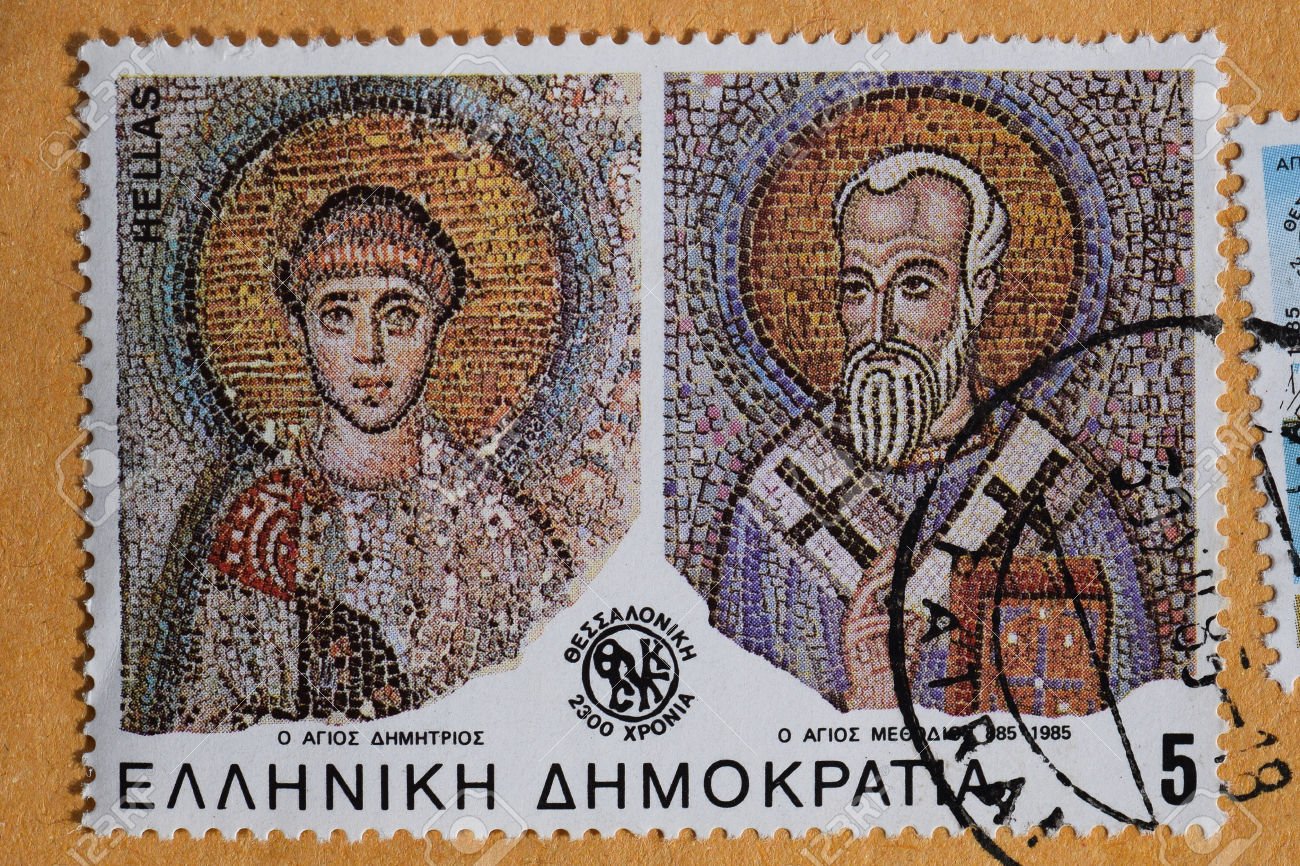Quotes from the Church Fathers Concerning the Biblical Flat Earth
WHAT DID Martin Luther, John Calvin, Augustine, Basil, Chrysostom, Hippolytus, Clement of Rome, and Justin Martyr, among many others, all have in common? They all believed Scripture’s account of the creation. And it’s flat.
Long before men like Darwin and Copernicus infiltrated the pages of our scripture and watered down the very Word of God, Paul made it clear in his Epistle to the Romans 3:4: “Let God be true and every man a liar.”
If you adhere to a geocentric worldview based on a clear teaching in scripture and you’re presently reading this, feeling as though you’re standing alone, perhaps you’ve even been outed as a heretic in your church – a pawn of Satan, as I myself have already been labeled; then don’t worry, you’re standing in excellent company.
What follows is a Flat Earth catalogue of quotes that I’m putting together, all categorized in alphabetical order (starting first with the Reformers), and directly lifted from the brilliant minds of our Church Father’s who’ve come before us. I’ll hopefully be updating this as I can read and uncover more Biblical commentary on the subject.
If I can leave Christian Flat Earth critics with one last thought. It is my personal observation that our greatest reformer Martin Luther was including the Copernican model into his critique of the stinking pile of heresies lifting from the Catholic Church. The Catholic Church did not reject Copernicus. The complete opposite is true. In fact, Copernicus was commissioned to rearrange our calendar! Luther wanted our belief to come from scripture alone, or Sola Scriptura, which holds that the Holy Bible is the sole infallible rule of faith and practice in our lives, not the Sacred Tradition of the Popes. In the case of Copernicus, it was Pope Clement VII. Please keep that in mind if you claim to hold to the values of the Reformers, or the Word of God. It is my personal contention that we finish now what Martin Luther started, and commence with the last great Reformation in human history.
The Great Delusion is here. And the final lie is coming.
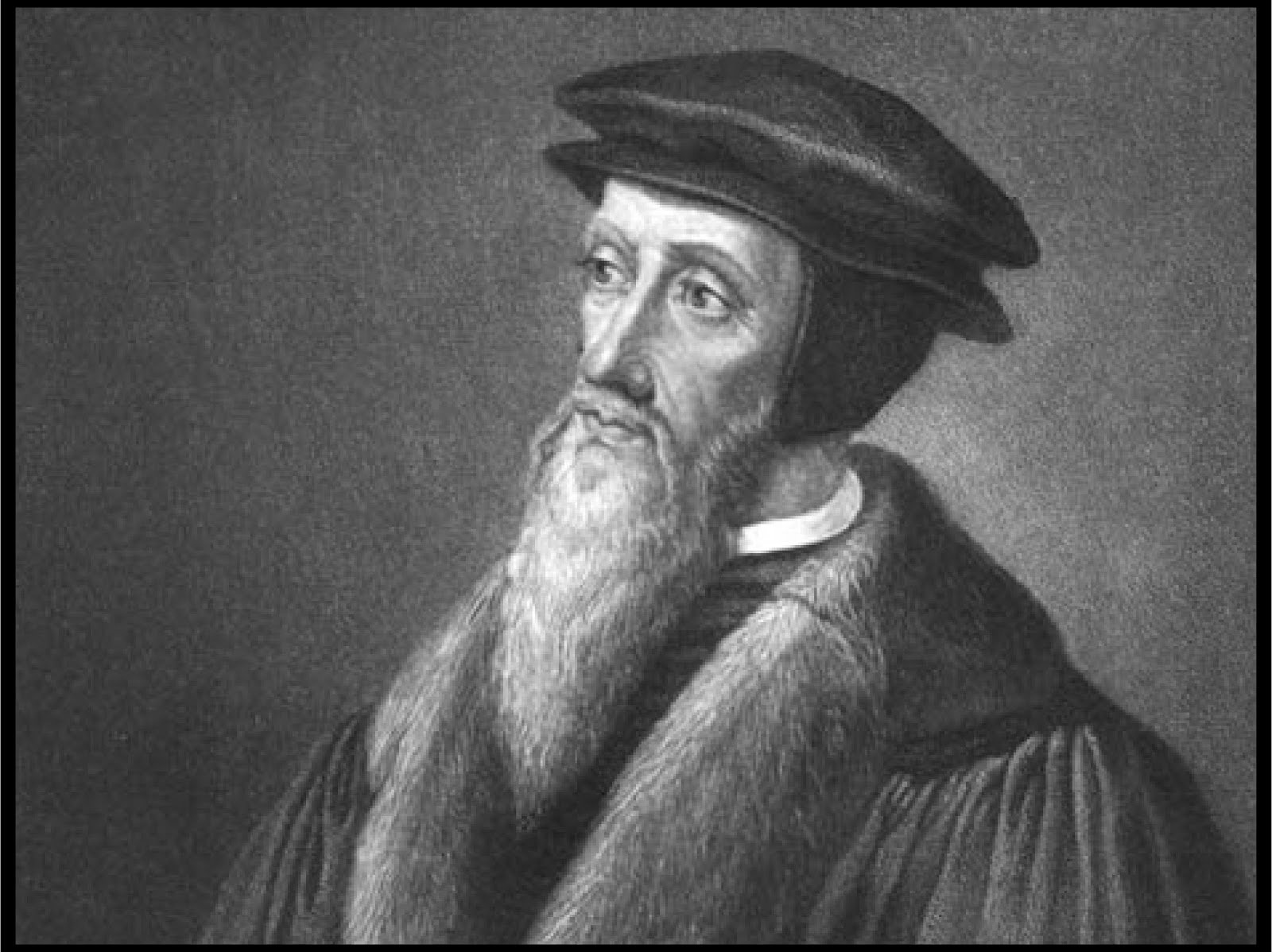
.
JOHN CALVIN
.
“The Christian is not to compromise so as to obscure the distinction between good and evil, and is to avoid the errors of] those dreamers who have a spirit of bitterness and contradiction, who reprove everything and prevent the order of nature. We will see some who are so deranged, not only in religion but who in all things reveal their monstrous nature that they will say that the sun does not move, and that it is the earth which shifts and turns. When we see such minds we must indeed confess that the devil possess them, and that God sets them before us as mirrors, in order to keep us in his fear. So it is with all who argue out of pure malice, and who happily make a show of their imprudence. When they are told: “That is hot,” they will reply: “No, it is plainly cold.” When they are shown an object that is black, they will say that it is white, or vice versa. Just like the man who said that snow is black; for although it is perceived and known by all to be white, yet he clearly wished to contradict the fact. And so it is that they are madmen who would try to change the natural order, and even to dazzle eyes and benumb their senses. (Sermon on 1 Corinthians 10:19-24, Calvini Opera Selecta, Corpus Refomatorum, Vol 49, 677, trans. by Robert White in “Calvin and Copernicus: the Problem Reconsidered”, Calvin Theological Journal 15 1980, p233-243, at 236-237)
“A simple survey of the world should of itself suffice to attest a Divine Providence. The heavens revolve daily, and, immense as is their fabric, and inconceivable the rapidity of their revolutions, we experience no concussion — no disturbance in the harmony of their motion. The sun, though varying its course every diurnal revolution, returns annually to the same point. The planets, in all their wanderings, maintain their respective positions. How could the earth hang suspended in the air were it not upheld by God’s hand? By what means could it maintain itself unmoved, while the heavens above are in constant rapid motion, did not its Divine Maker fix and establish it?” (Commentary on the Psalms: Volume IV, Ps 93:1)
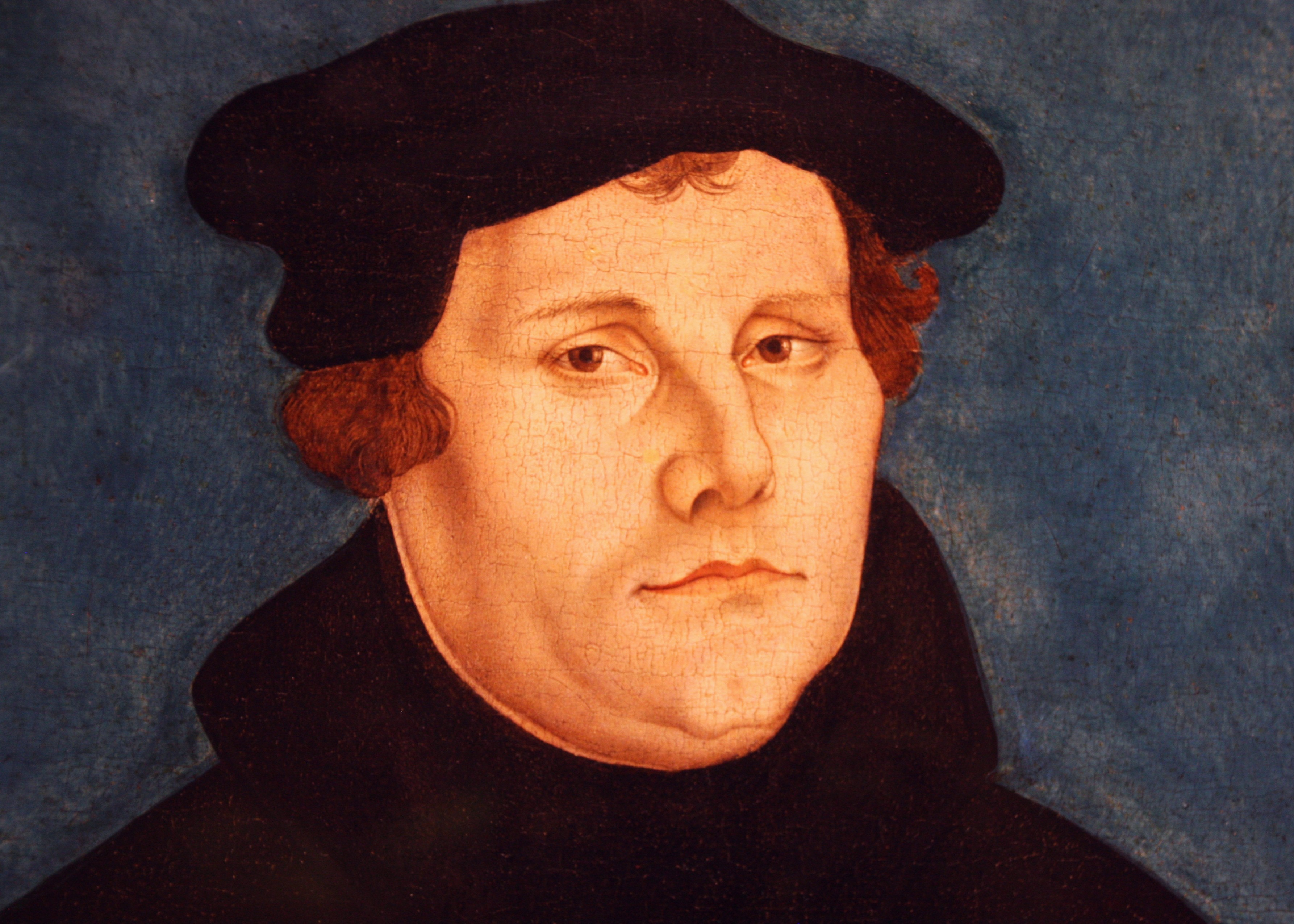
MARTIN LUTHER
.
“There is talk of a new astrologer who wants to prove that the earth moves and goes around instead of the sky, the sun, the moon, just as if somebody were moving in a carriage or ship might hold that he was sitting still and at rest while the earth and the trees walked and moved. But that is how things are nowadays: when a man wishes to be clever he must needs invent something special, and the way he does it must needs be the best! The fool wants to turn the whole art of astronomy upside-down. However, as Holy Scripture tells us, so did Joshua bid the sun to stand still and not the earth.”
.
PHILIPP MELANCHTHON
A.W. PINK
“Writing on Joshua 10:13, John Gill said, ‘How this is to be reconciled with the Copernican system or that with this, I shall not inquire.’ Wise man not to pretend to understand what has not been Divinely revealed. Wiser still in refusing to allow the theorizings of a Prussian astronomer to cast doubt on what He has made known, or to suggest an interpretation which ‘harmonizes’ the same with the hypothesis of ‘science falsely so called’ (1 Tim. 6:20).” (Gleanings in Joshua, 13. Victory At Gibeon, Joshua 10:1-43)
.
OUR EARLY CHURCH FATHERS
..
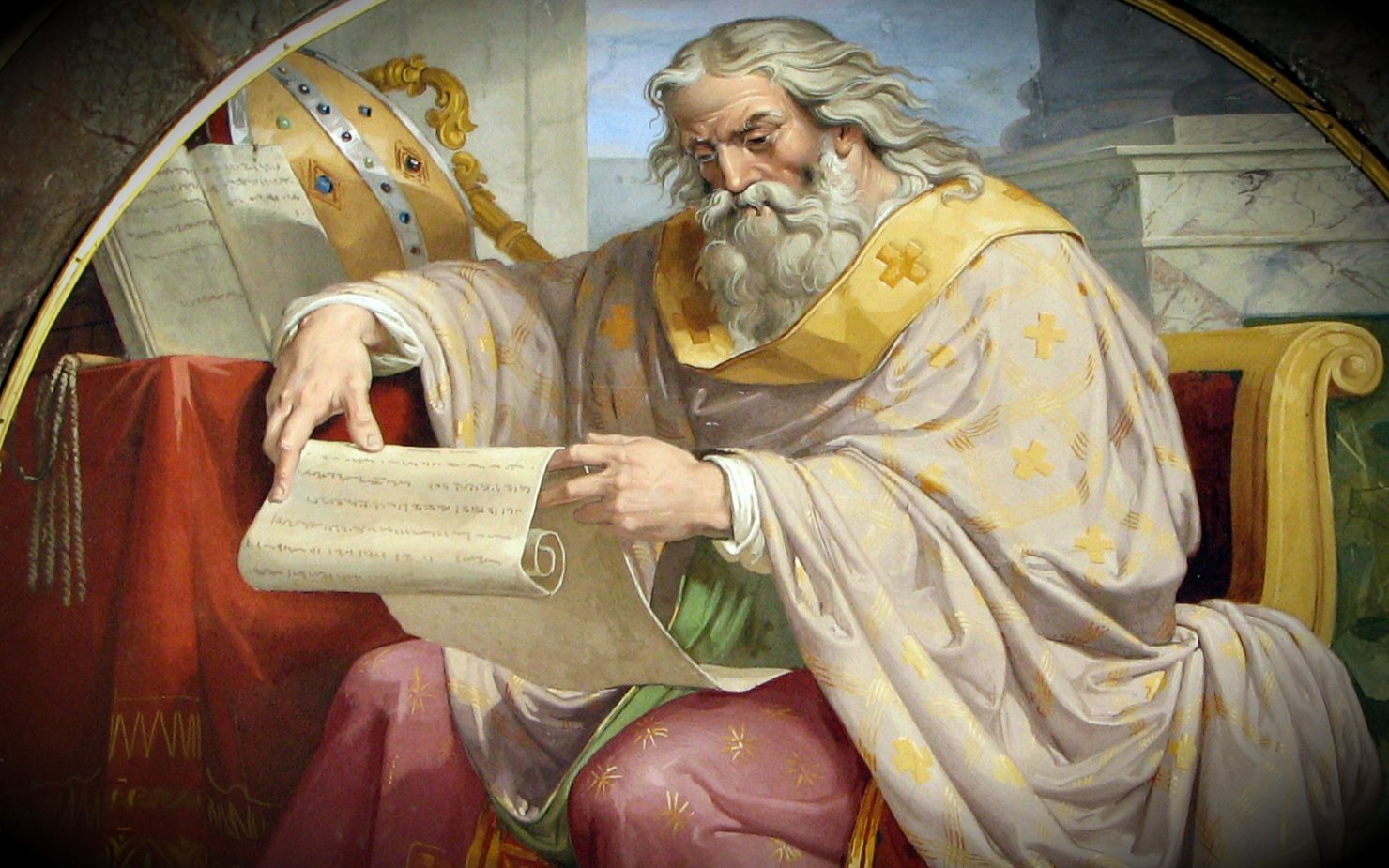
.
AMBROSE
.
Worthy surely was he to stand forth as a man who might stay the course of the river, and who might say: “Sun, stand still,” and delay the night and lengthen the day, as though to witness his victory. Why? a blessing denied to Moses–he alone was chosen to lead the people into the promised land. A man he was, great in the wonders he wrought by faith, great in his triumphs. The works of Moses were of a higher type, his brought greater success. Either of these then aided by divine grace rose above all human standing. The one ruled the sea, the other heaven. (Duties of the Clergy, Bk II, Ch XX, 99)
But they say that the sun can be said to be alone, because there is no second sun. But the sun himself has many things in common with the stars, for he travels across the heavens, he is of that ethereal and heavenly substance, he is a creature, and is reckoned amongst all the works of God. He serves God in union with all, blesses Him with all, praises Him with all. Therefore he cannot accurately be said to be alone, for he is not set apart from the rest. (Exposition of the Christian Faith, Bk V, Ch II)
.
ANATOLIUS OF ALEXANDRIA
.
Eudemus relates in his Astrologies that Enopides found out the circle of the zodiac and the cycle “of the great year. And Thales discovered the eclipse of the sun and its period in the tropics in its constant inequality. And Anaximander discovered that the earth is poised in space, and moves round the axis of the universe. And Anaximenes discovered that the moon has her light from the sun, and found out also the way in which she suffers eclipse. And the rest of the mathematicians have also made additions to these discoveries. We may instance the facts–that the fixed stars move round the axis passing through the poles, while the planets remove from each other round the perpendicular axis of the zodiac; and that the axis of the fixed stars and the planets is the side of a pente-decagon with four-and-twenty parts. (XVII)
.
APHRAHAT
.
“For the sun in twelve hours circles round, from the east unto the west; and when he has accomplished his course, his light is hidden in the night-time, and the night is not disturbed by his power. And in the hours of the night the sun turns round in his rapid course, and turning round begins to run in his accustomed path.” (Demonstrations, 24).
.
ARCHELUS
.
“When the light had been diffused everywhere, God began to constitute the universe, and commenced with the heaven and the earth; in which process this issue appeared, to wit, that the midst, which is the locality of earth covered with shadow, as a consequence of the interpositions of the creatures which were called into being, was found to be obscure, in such wise that circumstances required light to be introduced into that place, which was thus situated in the midst.” (Disputation with Manes, 22)
.
ARNOBIUS
.
The moon, the sun, the earth, the ether, the stars, are members and parts of the world; but if they are parts and members, they are certainly not themselves living creatures.” (Arnobius Against the Heathen, Book 3, 350)
.
.
ATHANASIUS
.
“But the earth is not supported upon itself, but is set upon the realm of the waters, while this again is kept in its place, being bound fast at the center of the universe.” (Against the Heathen, Book I, Part I)
“Who that sees the clouds supported in air, and the weight of the waters bound up in the clouds, can but perceive Him that binds them up and has ordered these things so? Or who that sees the earth, heaviest of all things by nature, fixed upon the waters, and remaining unmoved upon what is by nature mobile, will fail to understand that there is One that has made and ordered it, even God? Who that sees the earth bringing forth fruits in due season, and the rains from heaven, and the flow of rivers, and springing up of wells, and the birth of animals from unlike parents, and that these things take place not at all times but at determinate seasons—and in general, among things mutually unlike and contrary, the balanced and uniform order to which they conform—can resist the inference that there is one Power which orders and administers them, ordaining things well as it thinks fit? For left to themselves they could not subsist or ever be able to appear, on account of their mutual contrariety of nature. For water is by nature heavy, and tends to flow downwards, while the clouds are light and belong to the class of things which tend to soar and mount upwards. And yet we see water, heavy as it is, borne aloft in the clouds. And again, earth is very heavy, while water on the other hand is relatively light; and yet the heavier is supported upon the lighter, and the earth does not sink, but remains immovable. And male and female are not the same, while yet they unite in one, and the result is the generation from both of an animal like them. And to cut the matter short, cold is opposite to heat, and wet fights with dry, and yet they come together and are not at variance, but they agree, and produce as their result a single body, and the birth of everything.” (Against The Heathen, BK 1, Part I, 36)
“For who that sees the circle of heaven and the course of the sun and the moon, and the positions and movements of the other stars, as they take place in opposite and different directions, while yet in their difference all with one accord observe a consistent order, can resist the conclusion that these are not ordered by themselves, but have a maker distinct from themselves who orders them? or who that sees the sun rising by day and the moon shining by night, and waning and waxing without variation exactly according to the same number of days, and some of the stars running their courses and with orbits various and manifold, while others move without wandering, can fail to perceive that they certainly have a creator to guide them?” (Against the Heathen, Bk 1, Part III, 35)
“For by a nod and by the power of the Divine Word of the Father that governs and presides over all, the heaven revolves, the stars move, the sun shines, the moon goes her circuit, and the air receives the sun’s light and the aether his heat, and the winds blow: the mountains are reared on high, the sea is rough with waves, and the living things in it grow the earth abides fixed…” (Against the Heathen, Bk 1, Part III, 44)
“To Him is for us to know who stretched out and vaulted the heavens, and fixed the earth in its place like a center.” (Why the Christians do not Offer Sacrifices, Ch XIII)
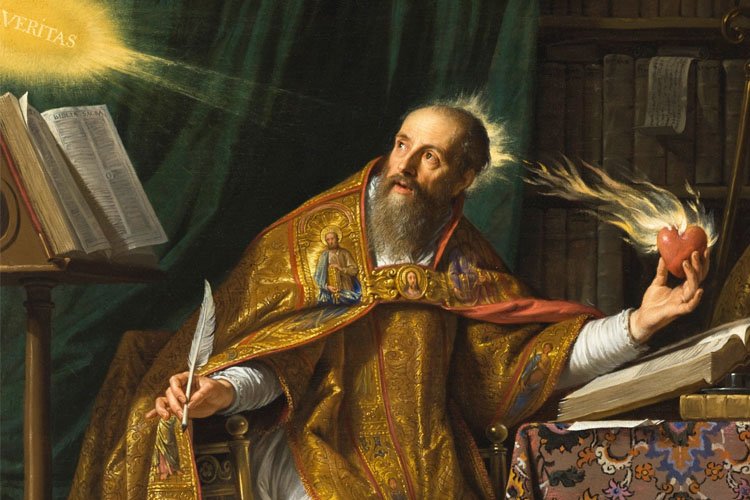
.
AUGUSTINE OF HIPPO
.
“Let not the philosophers, then, think to upset our faith with arguments from the weight of bodies; for I don’t care to inquire why they cannot believe an earthly body can be in heaven, while the whole earth is suspended on nothing. For perhaps the world keeps its central place by the same law that attracts to its center all heavy bodies.” (City of God, Bk XIII, Ch 18)
“For an eclipse of the sun had also happened; and this was attributed to the divine power of Romulus by the ignorant multitude, who did not know that it was brought about by the fixed laws of the sun’s course.” (City of God, Bk III, Ch 15)
“This he said either of those things of which he had just been speaking–the succession of generations, the orbit of the sun, the course of rivers,–or else of all kinds of creatures. that are born and die.” (City of God, Bk XII, Ch 13)
“What is there so arranged by the Author of the nature of heaven and earth as the exactly ordered course of the stars? What is there established by laws so sure and inflexible? And yet, when it pleased Him who with sovereignty and supreme power regulates all He has created, a star conspicuous among the rest by its size and splendor changed its color, size, form, and, most wonderful of all, the order and law of its course! Certainly that phenomenon disturbed the canons of the astronomers, if there were any then, by which they tabulate, as by unerring computation, the past and future movements of the stars, so as to take upon them to affirm that this which happened to the morning star (Venus) never happened before nor since. But we read in the divine books that even the sun itself stood still when a holy man, Joshua the son of Nun, had begged this from God until victory should finish the battle he had begun; and that it even went back, that the promise of fifteen years added to the life of king Hezekiah might be sealed by this additional prodigy. But these miracles, which were vouchsafed to the merits of holy men, even when our adversaries believe them, they attribute to magical arts; so Virgil, in the lines I quoted above, ascribes to magic the power to “Turn rivers backward to their source, And make the stars forget their course.” (City of God, Book XXI, Ch 8).
“Who else save Joshua the son of Nun divided the stream of the Jordan for the people to pass over, and by the utterance of a prayer to God bridled and stopped the revolving sun? Who save Samson ever quenched his thirst with water flowing forth from the jawbone of a dead ass? Who save Elias was carried aloft in a chariot of fire?” (Tractates, XCI, Ch XV, 24-25, 2)
“I desire to know the power and nature of time, by which we measure the motions of bodies, and say (for example) that this motion is twice as long as that. For, I ask, since “day” declares not the stay only of the sun upon the earth, according to which day is one thing, night another, but also its entire circuit from east even to east, according to which we say, “So many days have passed” (the nights being included when we say “so many days,” and their spaces not counted apart), since, then, the day is finished by the motion of the sun, and by his circuit from east to east, I ask, whether the motion itself is the day, or the period in which that motion is completed, or both? For if the first be the day, then would there be a day although the sun should finish that course in so small a space of time as an hour. If the second, then that would not be a day if from one sunrise to another there were but so short a period as an hour, but the sun must go round four-and-twenty times to complete a day. If both, neither could that be called a day if the sun should run his entire round in the space of an hour; nor that, if, while the sun stood still, so much time should pass as the sun is accustomed to accomplish his whole course in from morning to morning. I shall not therefore now ask, what that is which is called day, but what time is, by which we, measuring the circuit of the sun, should say that it was accomplished in half the space of time it was wont, if it had been completed in so small a space as twelve hours; and comparing both times, we should call that single, this double time, although the sun should run his course from east to east sometimes in that single, sometimes in that double time. Let no man then tell me that the motions of the heavenly bodies are times, because, when at the prayer of one the sun stood still in order that he might achieve his victorious battle, the sun stood still, but time went on. For in such space of time as was sufficient was that battle fought and ended. I see that time, then, is a certain extension. But do I see it, or do I seem to see it? Thou, O Light and Truth, wilt show me.” (Confessions, Bk XI, Ch XXIII, 30)
BASIL
.
“There are inquirers into nature who with a great display of words give reasons for the immobility of the earth…It is not, they go on, without reason or by chance that the earth occupies the center of the universe…Do not then be surprised that the world never falls: it occupies the center of the universe, its natural place. By necessity it is obliged to remain in its place, unless a movement contrary to nature should displace it. If there is anything in this system which might appear probable to you, keep your admiration for the source of such perfect order, for the wisdom of God. Grand phenomena do not strike us the less when we have discovered something of their wonderful mechanism. Is it otherwise here? At all events let us prefer the simplicity of faith to the demonstrations of reason.” (Nine Homilies on the Hexameron, 10)
“If the sun, subject to corruption, is so beautiful, so grand, so rapid in its move-meat, so invariable in its course; if its grandeur is in such perfect harmony with and due proportion to the universe: if, by the beauty of its nature, it shines like a brilliant eye in the middle of creation; if finally, one cannot tire of contemplating it, what will be the beauty of the Sun of Righteousness?” (Homilies, 6)
“From thence the sun, returning to the summer solstice, in the direction of the North, gives us the longest days. And, as it travels farther in the air, it burns that which is over our heads, dries up the earth, ripens the grains and hastens the maturity of the fruits of the trees.” (Homilies, 6, 8)
“It will not lead me to give less importance to the creation of the universe, that the servant of God, Moses, is silent as to shapes; he has not said that the earth is a hundred and eighty thousand furlongs in circumference; he has not measured into what extent of air its shadow projects itself whilst the sun revolves around it, nor stated how this shadow, casting itself upon the moon, produces eclipses.” (Homilies, IX)
“In the midst of the covering and veil, where the priests were allowed to enter, was situated the altar of incense, the symbol of the earth placed in the middle of this universe; and from it came the fumes of incense.” (The Mystic Meaning of the Tabernacle, Bk V, Ch VI; Clement of Rome, Stromata, Bk V)
“Like tops, which after the first impulse, continue their evolutions, turning upon themselves when once fixed in their centre; thus nature, receiving the impulse of this first command, follows without interruption the course of ages, until the consummation of all things.” (Homilies, V, 10)
Book of the Bee
OF THE FIRMAMENT
ON the evening of the second day of the week, God willed to divide the heavens from the earth, that there might be luminaries and stars beneath the heavens to give light to this world, and that the heavens might be a dwelling-place for the righteous and the angels after the resurrection. God said, ‘Let there be a firmament which shall divide the waters from the waters1‘; and straightway the waters were divided into three parts. One part remained upon the earth for the use of men, cattle, winged fowl–the rivers and the seas; of another part God made the firmament; and the third part He took up above the firmament. But on the day of resurrection the waters will return to their former nature.
Book of the Bee (chapter 8)

JOHN CASSIAN
.
He was a man who, after the close of his life had been decreed and the day of his death determined by the Lord’s sentence, prevailed by a single prayer to extend the limits set to his life by fifteen years, the sun returning by ten steps, on which it had already shone in its course towards its setting, and by its return dispersing those lines which the shadow that followed its course had already marked, and by this giving two days in one to the whole world, by a stupendous miracle contrary to the fixed laws of nature. Yet after signs so great and so incredible, after such immense proofs of his goodness, hear the Scripture tell how he was destroyed by his very successes. (Twelve Books on the Institutes, Bk XI, Ch X).
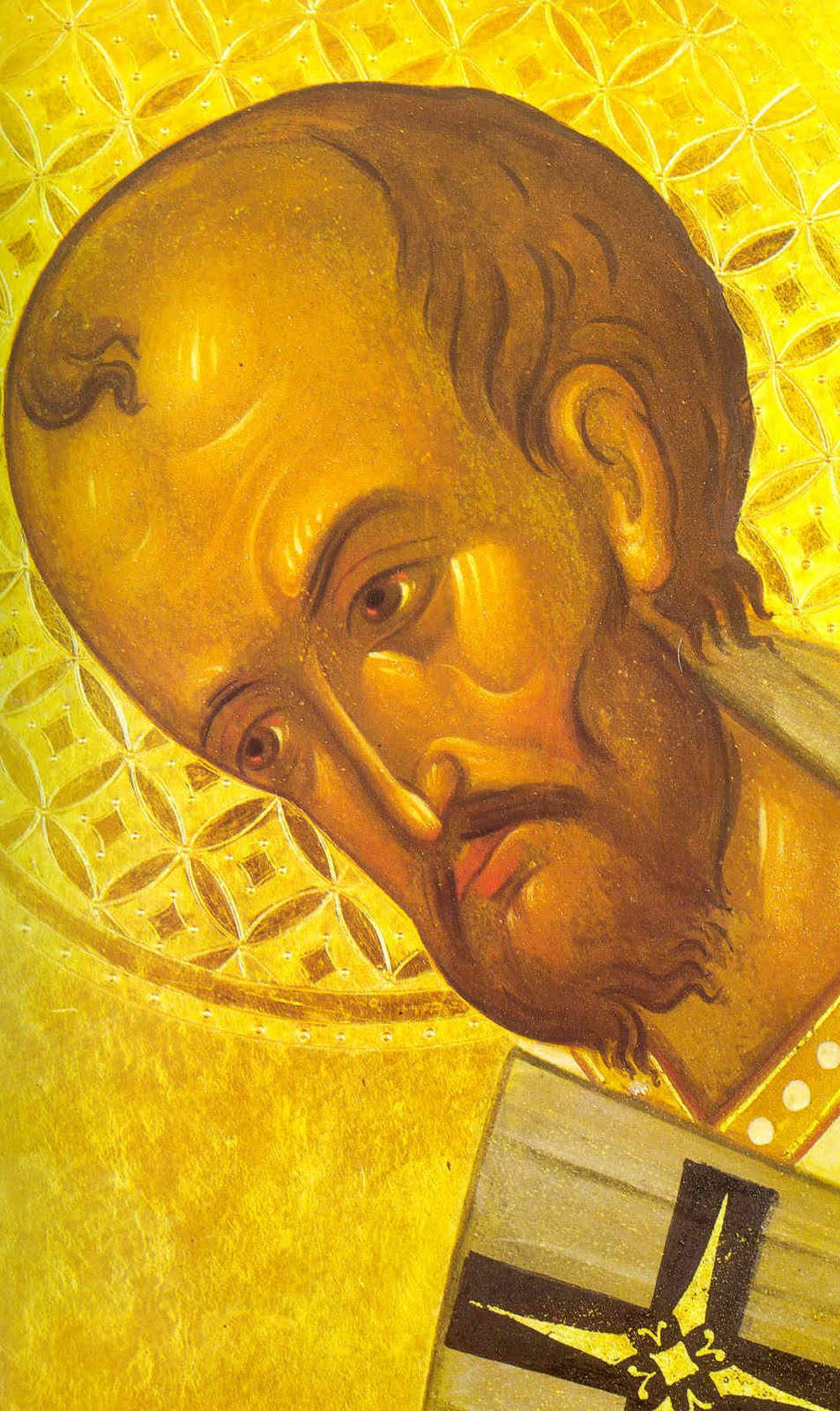
CHRYSOSTOM
.
“When therefore thou beholdest not a small pebble, but the whole earth borne upon the waters, and not submerged, admire the power of Him who wrought these marvellous things in a supernatural manner! And whence does this appear, that the earth is borne upon the waters? The prophet declares this when he says, “He hath founded it upon the seas, and prepared it upon the floods.” And again: “To him who hath founded the earth upon the waters.” What sayest thou? The water is not able to support a small pebble on its surface, and yet bears up the earth, great as it is; and mountains, and hills, and cities, and plants, and men, and brutes; and it is not submerged!”
(Homilies Concerning the Statutes, Homily IX, paras.7-8, in A Select Library Of The Nicene And Post-Nicene Fathers Of The Christian Church, Series I, Vol IX, ed. Philip Schaff, D.D.,LL.D., American reprint of the Edinburgh edition (1978), W. B. Eerdmans Publishing Co.,Grand Rapids, MI, pp.403-404)
“Dost thou not see how God is daily blasphemed and mocked by believers and unbelievers, both in word and in deed? What then? Has He for this extinguished the sun? or stayed the course of the moon? Has He crushed the heavens and uprooted the earth? Has He dried up the sea? Has He shut up the fountains of waters? or confounded the air? Nay, on the contrary, He makes His sun to rise, His rain to descend, gives the fruits of the earth in their seasons, and thus supplies yearly nourishment to the blasphemers, to the insensible, to the polluted, to persecutors; not for one day or two, but for their whole life. Imitate Him then, emulate Him as far as human powers admit. Can thou not make the sun arise?” (Homilies on First Timothy, Homily VI)
“And what took place at a later period were few and at intervals; for example, when the sun stood still in its course, and started back in the opposite direction. And this one may see to have occurred in our case also. For so even in our generation, in the instance of him who surpassed all in ungodliness, I mean Julian, many strange things happened. Thus when the Jews were attempting to raise up again the temple at Jerusalem, fire burst out from the foundations, and utterly hindered them all.” (Homilies on Matthew, Homily IV)
“And again, David saith of the sun, that “he is as a bridegroom coming out of his chamber, and rejoiceth as a giant to run his course.” Seest thou how he places before thee the beauty of this star, and its greatness? For even as a bridegroom when he appears from some stately chamber, so the sun sends forth his rays under the East; and adorning the heaven as it were with a saffron-colored veil, and making the clouds like roses, and running unimpeded all the day; he meets no obstacle to interrupt his course. Beholdest thou, then, his beauty?” (Homilies to Antioch, Homily X)
“For He not only made it, but provided also that when it was made, it should carry on its operations; not permitting it to be all immoveable, nor commanding it to be all in a state of motion. The heaven, for instance, hath remained immoveable, according as the prophet says, “He placed the heaven as a vault, and stretched it out as a tent over the earth.” But, on the other hand, the sun with the rest of the stars, runs on his course through every day. And again, the earth is fixed, but the waters are continually in motion; and not the waters only, but the clouds, and the frequent and successive showers, which return at their proper season.” (Homilies to Antioch, Homily XII)
“[Speaking of the end of the world]: For the heaven shall be disturbed and the earth shall be shaken from its foundations by reason of the fury of the wrath of the Lord of Sabaoth, in the day when His wrath shall come upon us.” And again “windows” he saith “shall be opened from the Heaven, and the foundations of the earth shall be shaken the earth shall be mightily confounded, the earth shall be bent low, it shall be perplexed with great perplexity, the earth shall stagger grievously like the drunkard and the reveller; the earth shall shake as a hut, it shall fall and not be able to rise up again: for iniquity has waxed mighty therein. And God shall set His hand upon the host of the Heaven in the height in that day, and upon the kingdoms of the earth, and He shall gather together the congregation thereof into a prison, and shall shut them up in a stronghold.” And Malachi speaking concordantly with these said” Behold the Lord almighty cometh, and who shall abide the day of His coming or who shall stand when He appeareth? for He cometh like a refiner’s fire, and like fullers soap: and He shall sit refining and purifying as it were silver, and as it were gold.” (Letters to Theodor, Letter I, 12)
“Consider of how great value is the righteous man. Joshua the son of Nun said, “Let the sun stand still at Gibeon, the moon at the valley of Elom” (Josh. x. 12), and it was so. Let then the whole world come, or rather two or three, or four, or ten, or twenty worlds, and let them say and do this; yet shall they not be able. But the friend of God commanded the creatures of his Friend, or rather he besought his Friend, and the servants yielded, and he below gave command to those above. Seest thou that these things are for service fulfilling their appointed course?”
“This was greater than the [miracles] of Moses. Why (I ask)? Because it is not a like thing to command the sea and the heavenly [bodies]. For that indeed was also a great thing, yea very great, nevertheless it was not at all equal [to the other]. Why was this? The name of Joshua [JESUS], was a type. For this reason then, and because of the very name, the creation reverenced him. What then! Was no other person called Jesus? [Yes]; but this man was on this account so called in type; for he used to be called Hoshea. Therefore the name was changed: for it was a prediction and a prophecy. He brought in the people into the promised land, as JESUS [does] into heaven; not the Law; since neither did Moses [bring them in], but remained without.” (Homily on the Epistle to the Hebrews, Homily VIII)
“Therefore it was, that Joshua, the son of Nave, said, “Let the sun stand still in Gibeon, and the moon over against the valley of Ajalon.’ And again the prophet Isaiah made the sun to retrace his steps, under the reign of Hezekiah; and Moses gave orders to the air, and the sea, the earth, and the rocks. Elisha changed the nature of the waters; the Three Children triumphed over the fire. Thou seest how God hath provided for us on either hand; leading us by the beauty of the elements to the knowledge of His divinity; and, by their feebleness, not permitting us to lapse into the worship of them.” (Homily to Antioch, Homily X)
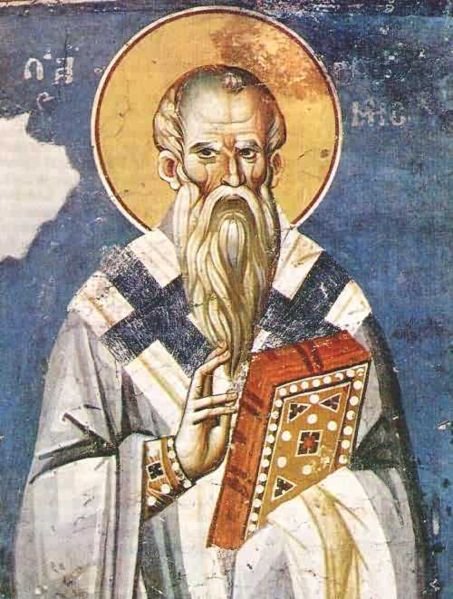
CLEMENT OF ROME
.
“The sun and moon, with the companies of the stars, roll on in harmony according to His command, within their prescribed limits, and without any deviation.” (First Epistle to the Corinthians, Ch XX).
“The Creator, long-suffering, merciful, the sustainer, the benefactor, ordaining love of men, counseling purity, immortal and making immortal, incomparable, dwelling in the souls of the good, that cannot be contained and yet is contained, who has fixed the great world as a centre in space, who has spread out the heavens and solidified the earth.” (Homily II, Ch XLV)
“For it is manifest even to the unbelieving and unskillful, that the course of the sun, which is useful and necessary to the world, and which is assigned by providence, is always kept orderly; but the courses of the moon, in comparison of the course of the sun, seem to the unskilful to be inordinate and unsettled in her waxings and wanings. For the sun moves in fixed and orderly periods: for from him are hours, from him the day when he rises, from him also the night when he sets; from him months and years are reckoned, from him the variations of seasons are produced; while, rising to the higher regions, he tempers the spring; but when he reaches the top of the heaven, he kindles the summer’s heats: again, sinking, he produces the temper of autumn; and when he returns to his lowest circle, he bequeaths to us the rigour of winter’s cold from the icy binding of heaven.” (Pseudo-Clementine, Bk VIII, Ch XLV)
![]()
CYRIL OF JERUSALEM
.
“And he, who could not hope to live because of the prophetic sentence, had fifteen years added to his life, and for the sign the sun ran backward in his course Well then, for Ezekias’ sake the sun turned back but for Christ the sun was eclipsed, not retracing his steps, but suffering eclipse, and therefore shewing the difference between them, I mean between Ezekias and Jesus.” (Catechetical Lectures, II, 15)
“The earth, which bears the same proportion to the heaven as the center to the whole circumference of a wheel, for the earth is no more than this in comparison with the heaven: consider then that this first heaven which is seen is less than the second, and the second than the third, for so far Scripture has named them…” (Catechetical Lectures, VI, 3)

EPHRAIM THE SYRIAN
“The sun in his course teaches thee that thou rest from labour.” (On Admonition and Repentance)
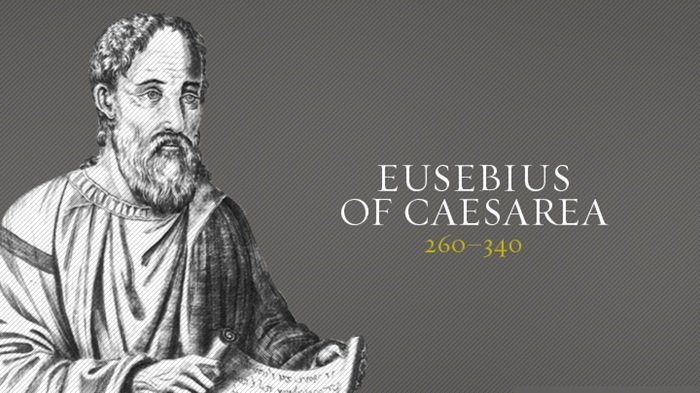 EUSEBIUS OF CAESAREA
EUSEBIUS OF CAESAREA
.
“The vast expanse of heaven, like an azure veil is interposed between those without, and those who inhabit his royal mansions: while round this expanse the sun and moon, with the rest of the heavenly luminaries (like torch- bearers around the entrance of the imperial palace), perform, in honor of their sovereign, their appointed courses; holding forth, at the word of his command, an ever-burning light to those whose lot is cast in the darker regions without the pale of heaven.” (Oration of Constantine, Ch 1).
“To whom he has permitted the contemplation of celestial objects, and revealed the course and changes of the sun and moon, and the periods of the planets and fixed stars.” (Oration of Constantine, Ch VI).
“Even so one and the same impression of the solar rays illumines the air at once, gives light to the eyes, warmth to the touch, fertility to the earth, and growth to plants. The same luminary constitutes the course of time, governs the motions of the stars, performs the circuit of the heavens, imparts beauty to the earth, and displays the power of God to all: and all this he performs by the sole and unaided force of his own nature.” (Oration of Constantine, Ch XII)
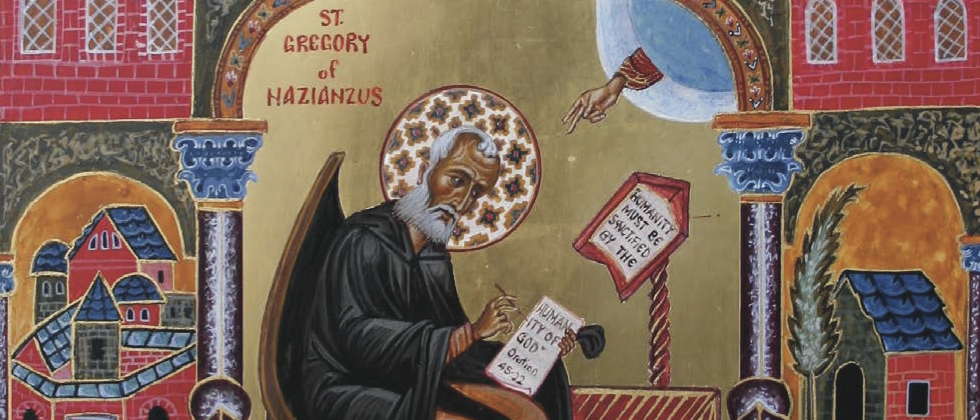
GREGORY NANZIANZUS
.
“But who gave him motion at first? And what is it which ever moves him in his circuit, though in his nature stable and immovable, truly unwearied, and the giver and sustainer of life, and all the rest of the titles which the poets justly sing of him, and never resting in his course or his benefits? How comes he to be the creator of day when above the earth, and of night when below it? or whatever may be the right expression when one contemplates the sun?” (Orations, Oration XXVIII, XXX)
“The sun is extolled by David for its beauty, its greatness, its swift course, and its power, splendid as a bridegroom, majestic as a giant; while, from the extent of its circuit, it has such power that it equally sheds its light from one end of heaven to the other, and the heat thereof is in no wise lessened by distance.” (Funeral Orations for St. Basil, 66)
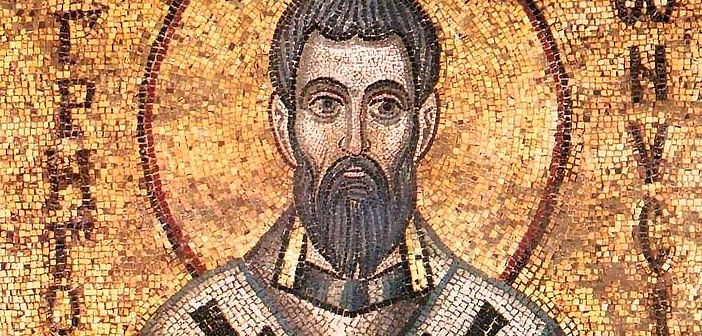
GREGORY OF NYSSA
.
“’This is the book of the generation of heaven and earth,’ saith the Scripture, when all that is seen was finished, and each of the things that are betook itself to its own separate place, when the body of heaven compassed all things round, and those bodies which are heavy and of downward tendency, the earth and the water, holding each other in, took the middle place of the universe; while, as a sort of bond and stability for the things that were made, the Divine power and skill was implanted in the growth of things, guiding all things with the reins of a double operation (for it was by rest and motion that it devised the genesis of the things that were not, and the continuance of the things that are), driving around, about the heavy and changeless element contributed by the creation that does not move, as about some fixed path, the exceedingly rapid motion of the sphere, like a wheel, and preserving the indissolubility of both by their mutual action, as the circling substance by its rapid motion compresses the compact body of the earth round about, while that which is firm and unyielding, by reason of its unchanging fixedness, continually augments the whirling motion of those things which revolve round it, and intensity s is produced in equal measure in each of the natures which thus differ in their operation, in the stationary nature, I mean, and in the mobile revolution; for neither is the earth shifted from its own base, nor does the heaven ever relax in its vehemence, or slacken its motion.” (On the Making of Man, 30, 1, 1)
“But, boasting as they do that they know these things, let them first tell us about the things of inferior nature; what they think of the body of the heavens, of the machinery which conveys the stars in their eternal courses, or of the sphere in which they move; for, however far speculation may proceed, when it comes to the uncertain and incomprehensible it must stop. For though any one say that another body, like in fashion (to that body of the heavens), fitting to its circular shape, checks its velocity, so that, ever turning in its course, it revolves conformably to that other upon itself, being retained by the force that embraces it from flying off at a tangent, yet how can he assert that these bodies will remain unspent by their constant friction with each other? And how, again, is motion produced in the case of two coeval bodies mutually conformed, when the one remains motionless (for the inner body, one would have thought, being held as in a vice by the motionlessness of that which embraces it, will be quite unable to act); and what is it that maintains the embracing body in its fixedness, so that it remains unshaken and unaffected by the motion of that which fits into it?” (Answer to Eunomius’ Second Book)
“And how does earth below form the foundation of the whole, and what is it that keeps it firmly in its place? what is it that controls its downward tendency? If any one should interrogate us on these and such-like points, will any of us be found so presumptuous as to promise an explanation of them? No! the only reply that can be given by men of sense is this:–that He Who made all things in wisdom can alone furnish an account of His creation. For ourselves, “through faith we understand that the worlds were framed by the word of God,” as saith the Apostle.” (Answer to Eunomius’ Second Book)
“…the vault of heaven prolongs itself so uninterruptedly that it encircles all things with itself, and that the earth and its surroundings are poised in the middle, and that the motion of all the revolving bodies is round this fixed and solid center…” (On the Soul and Resurrection)
“…on whatever side the sun’s rays may fall on some particular point of the globe, if we follow a straight diameter, we shall find shadow upon the opposite point, and so, continuously, at the opposite end of the direct line of the rays shadow moves round that globe, keeping pace with the sun, so that equally in their turn both the upper half and the under half of the earth are in light and darkness…” (On the Soul and Resurrection)
“And when you look at the waning and waxing moon you are taught other truths by the visible figure of that heavenly body, viz. that it is in itself devoid of light, and that it revolves in the circle nearest to the earth, and that it is lit by light from the sun; just as is the case with mirrors, which, receiving the sun upon them, do not reflect rays of their own, but those of the sun, whose light is given back from their smooth flashing surface. Those who see this, but do not examine it, think that the light comes from the moon herself. But that this is not the case is proved by this; that when she is diametrically facing the sun she has the whole of the disc that looks our way illuminated; but, as she traverses her own circle of revolution quicker from moving in a narrower space, she herself has completed this more than twelve times before the sun has once traveled round his; whence it happens that her substance is not always covered with light.” (On the Soul and Resurrection).

GREGORY THAUMATURGOS
“And the life of men weareth away, as day by day, and in the periods of hours and years, and the determinate courses of the sun, some are ever coming, and others passing away. And the matter is like the transit of torrents as they fall into the measureless deep of the sea with a mighty noise. And all things that have been constituted by God for the sake of men abide the same: as, for instance, I that man is born of earth, and departs to earth again; that the earth itself continues stable; that the sun accomplishes its circuit about it perfectly, and rolls round to the same mark again; and that the winds in like manner, and the mighty rivers which flow into the sea, and the breezes that beat upon it, all act without forcing it to pass beyond its limits, and without themselves also violating their appointed laws.” (On Ecclesiastes, Ch 1, 2)
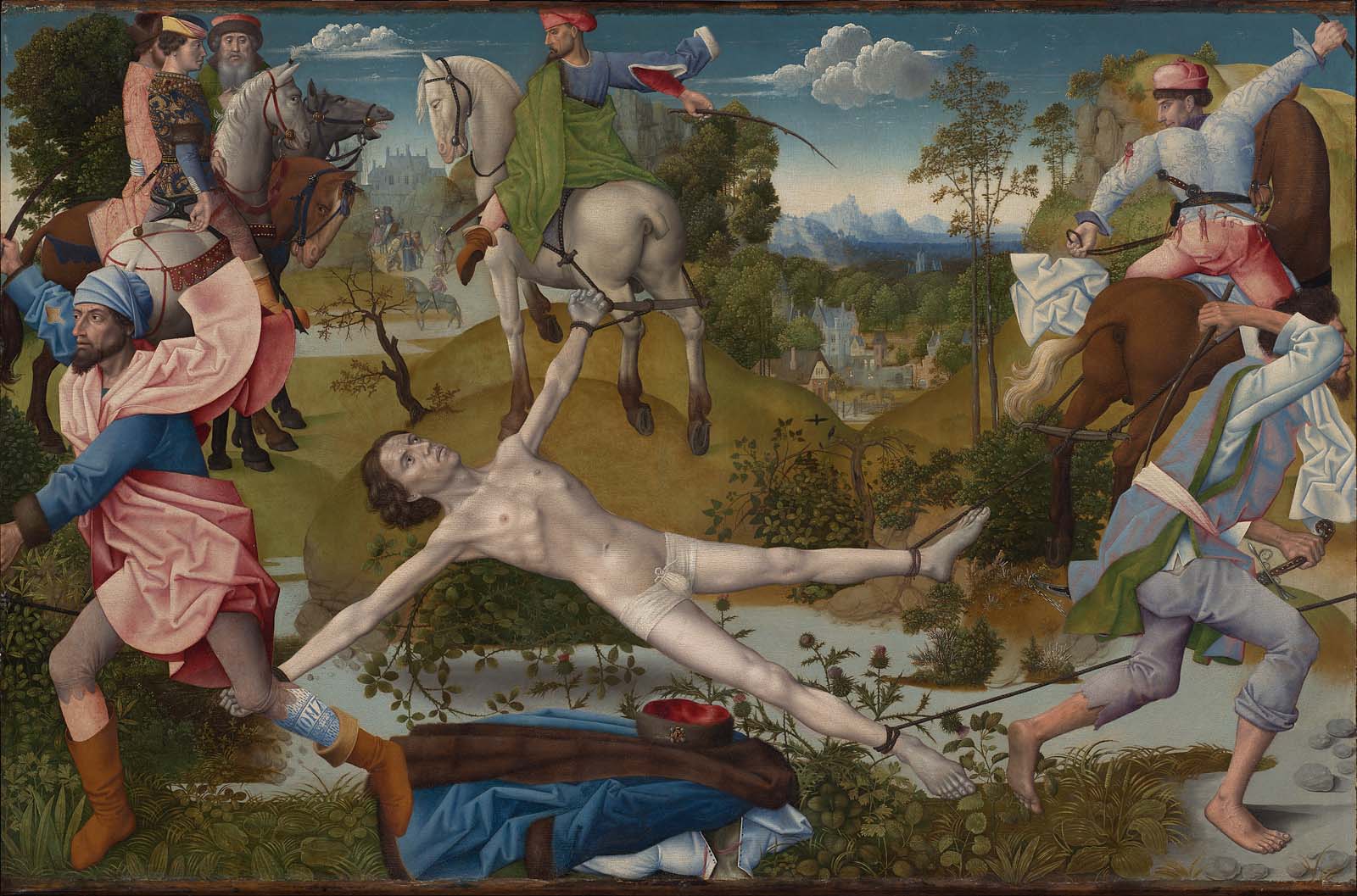
HIPPOLYTUS
.
“When Hezekiah, king of Judah, was still sick and weeping, there came an angel, and said to him: “I have seen thy tears, and I have heard thy voice. Behold, I add unto thy time fifteen years. And this shall be a sign to thee from the Lord: Behold, I turn back the shadow of the degrees of the house of thy father, by which the sun has gone down, the ten degrees by which the shadow has gone down,” so that day be a day of thirty-two hours. For when the sun had run its course to the tenth hour, it returned again. And again, when Joshua the son of Nun was fighting against the Amorites, when the sun was now inclining to its setting, and the battle was being pressed closely, Joshua, being anxious lest the heathen host should escape on the descent of night, cried out, saying, “Sun, stand thou still in Gibeon; and thou moon, in the valley of Ajalon,” until I vanquish this people. And the sun stood still, and the moon, in their places, so that day was one of twenty-four hours. And in the time of Hezekiah the moon also turned back along with the sun, that there might be no collision between the two elemental bodies, by their bearing against each other in defiance of law. And Merodach the Chaldean, king of Babylon, being struck with amazement at that time–for he studied the science of astrology, and measured the courses of these bodies carefully – on learning the cause, sent a letter and gifts to Hezekiah, just as also the wise men from the east did to Christ.” (Fragments, I, Discourse on Hezekiah).
“We find in the commentaries, written by our predecessors, that day had thirty-two hours. For when the sun had run its course, and reached the tenth hour, and the shadow had gone down by the ten degrees in the house of the temple, the sun turned back again by the ten degrees, according to the word of the Lord, and there were thus twenty hours. And again, the sun accomplished its own proper course, according to the common law, and reached its setting. And thus there were thirty-two hours.” (Fragments, III, Discourse on Hezekiah).
“For what richer beauty can there be than that of the circle of heaven? And what form of more blooming fairness than that of earth’s surface? And what is there swifter in the course than the chariot of the sun? And what more graceful car than the lunar orb? And what work more wonderful than the compact mosaic of the stars? And what more productive of supplies than the seasonable winds? And what more spotless mirror than the light of day? And what creature more excellent than man?” (Discourse on the Holy Theophany, 1)
[Refuting the view of the Greek Ecphantus]: “And that the earth in the middle of the cosmical system is moved round its own center towards the east.” (The Prooemium, Ch XIII)

.
IRENAEUS OF LYONS
.
“The sun also, who runs through his orbit in twelve months, and then returns to the same point in the circle.” (Against Heresies, Bk I, Ch XVII, 1)

JEROME
.
“In Exodus we read that the battle was fought against Amalek while Moses prayed, and the whole people fasted until the evening. Joshua, the son of Nun, bade sun and moon stand still, and the victorious army prolonged its fast for more than a day.” (Against Jovinianus, Bk 2).
“The moon may dispute over her eclipses and ceaseless toil, and ask why she must traverse every month the yearly orbit of the sun. The sun may complain and want to know what he has done that he travels more slowly than the moon.” (Against the Pelagians, Bk I, 19)
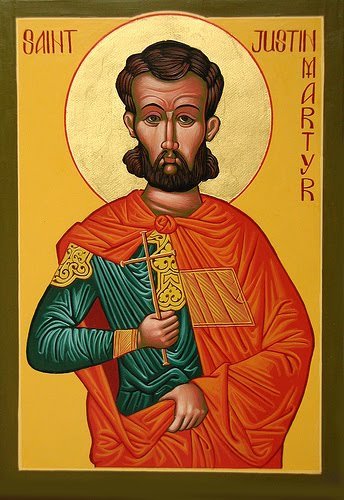
JUSTIN MARTYR
.
“The former, after he had been named Jesus (Joshua), and after he had received strength from. His Spirit, caused the sun to stand still.” (Dialogue with Trypho, Ch CXIII)
“And again, when the land was given up to you with so great a display of power, that you witnessed the sun stand still in the heavens by the order of that man whose name was Jesus (Joshua), and not go down for thirty-six hours, as well as all the other miracles which were wrought for you as time served; and of these it seems good to me now to speak of another, for it conduces to your hereby knowing Jesus, whom we also know to have been Christ the Son of God, who was crucified, and rose again, and ascended to heaven, and will come again to judge all men, even up to Adam himself.” (Dialogue with Trypho, Ch CXXXII)
.
MATHETES
.
“…by whom He made the heavens – by whom he enclosed the sea within its proper bounds–whose ordinances all the stars faithfully observe–from whom the sun has received the measure of his daily course to be observed – whom the moon obeys, being commanded to shine in the night, and whom the stars also obey, following the moon in her course; by whom all things have been arranged, and placed within their proper limits.” (To Diognetes, Ch 7)
.
MEMOIRS OF EDESSA
.
“For look at the sun, and the moon, and the signs of the zodiac,(4) and all the other creatures which are greater than we in some points, and see how individual freedom has been denied them, and how they are all fixed in their course by decree, so that they may do that only which is decreed for them, and nothing else. For the sun never says, I will not rise at my appointed time; nor the moon, I will not change, nor wane, nor wax; nor does any one of the stars say, I will not rise nor set.” (Book of the Laws)
.
.
METHODIUS
.
“And, of a truth, it seemed worth while to inquire also about the sun,–what is the manner of his being set in the heaven; also what is the orbit he traverses; also whither it is that, after a short time, he retires; and why it is that even he does not go out of his proper course: but he, too, as one may say, is observing a commandment of a higher power, and appears with us just when he is allowed to do so, and departs as if he were called away.” (Concerning Free Will)
“Resuming then, let us first lay bare, in speaking of those things according to our power, the imposture of those who boast as though they alone had comprehended from what forms the heaven is arranged, in accordance with the hypothesis of the Chaldeans and Egyptians. For they say that the circumference of the world is likened to the turnings of a well-rounded globe, the earth having a central point. For its outline being spherical, it is necessary, they say, since there are the same distances of the parts, that the earth should be the center of the universe, around which, as being older, the heaven is whirling. For if a circumference is described from the central point, which seems to be a circle, for it is impossible for a circle to be described without a point, and it is impossible for a circle to be without a point,–surely the earth consisted before all, they say, in a state of chaos and disorganization.” (Banquet of the Ten Virgins, Discourse VIII, Ch XIV)
.
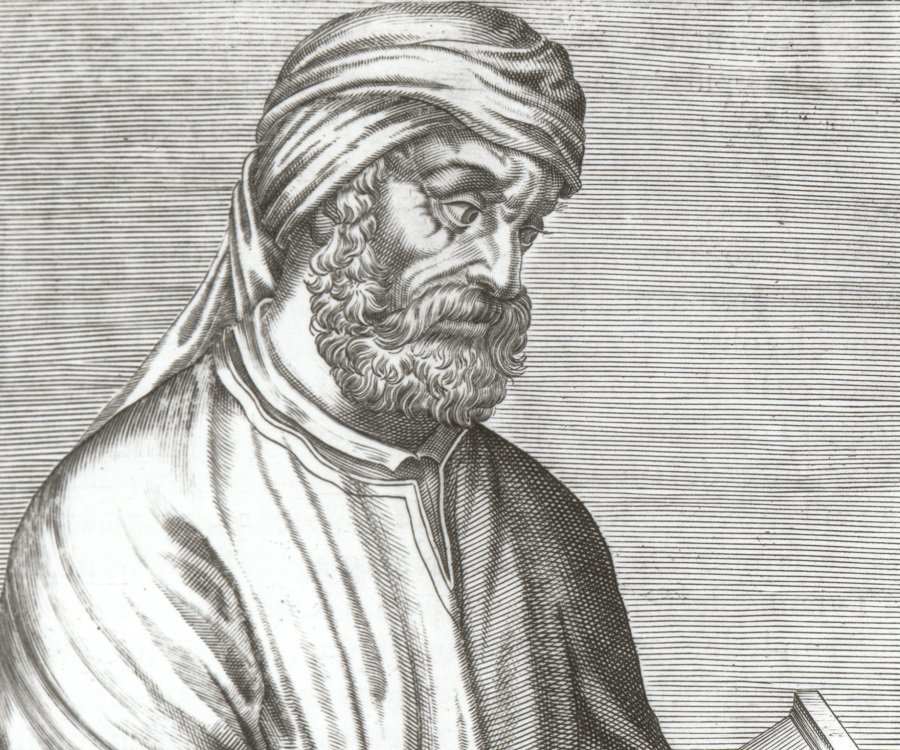
.
TERTULLIAN
.
“In Exodus, was not that position of Moses, battling against Amalek by prayers, maintained as it was perseveringly even till “sunset,” a “late Station?” Think we that Joshua the son of Nun, when warring down the Amorites, had breakfasted on that day on which he ordered the very elements to keep a Station? The sun “stood” in Gibeon, and the moon in Ajalon; the sun and the moon “stood in station until the People was avenged of his enemies, and the sun stood in the mid heaven.” When, moreover, (the sun) did draw toward his setting and the end of the one day, there was no such day beforetime and in the latest time (of course, (no day) so long), “that God,” says (the writer), “should hear a man” – (a man,) to be sure, the sun’s peer, so long persistent in his duty – a Station longer even than late.” (On Fasting, Ch X)
*A special thanks to Philip Stallings and the Biblical Flat Earth Society for this information


